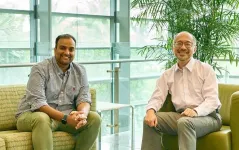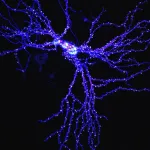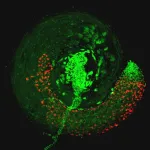“I am thrilled to head the Max Planck Partner Group, which will create a formal channel of collaboration between my new group and the experts at MPFI. This partnership will help launch my research program in India,” says Dr. Jain.
The Max Planck Partner Group program aims to support emerging scientists while building international collaborations with countries interested in strengthening their research. The program is aimed at talented junior researchers who have previously worked at a Max Planck Institute and enables them to continue their work while establishing a new research group abroad. There are more than 70 Max Planck Partner Groups worldwide.
Dr. Jain’s research will focus on mechanisms that maintain brain stability. These mechanisms, known as homeostatic plasticity, compensate for rapid changes during learning to maintain brain activity within a range required for brain health. “These changes are critical to rebalance our brain circuits and maintain the ability to keep learning throughout life,” explains Dr Jain. “We have a limited understanding of how homeostatic mechanisms work in the context of learning, and hope to provide insights into this.” Jain’s research will also use cellular models of autism to investigate how homeostatic processes work differently in people with autism. Children with autism have a much higher incidence of epileptic seizures, which are a hallmark of homeostatic failure.
Critical to Jain’s work is the development of novel biosensors to see homeostatic mechanisms as they function. This biotechnology innovation is one area that will be aided by his partnership with MPFI, home to two world experts in biosensor development, Dr. Ryohei Yasuda and Dr. Lin Tian.
Dr. Yasuda describes his enthusiasm for the partnership, “I am excited to support and celebrate Anant as he launches his own research program addressing critical unanswered questions of brain function. Given his scientific talent and accomplishments, and with the continued support from MPFI through the Max Planck Partnership program, he will be able to significantly impact the understanding of altered plasticity in autism and will expand cutting-edge neuroscience research in India.”
TCG CREST was founded in 2020 by private equity firm The Chatterjee Group. The institute focuses on creating a global scientific collaboration to facilitate fundamental research. Located in Kolkata, India, the organization also provides graduate and postgraduate education programs as well as executive education programs. In addition to neuroscience, TCG CREST focuses on AI, sustainable energy, and quantum engineering.
Dr. Jain expressed his hope for a growing relationship between the institutes, “I look forward to exposing my trainees to the cutting-edge research at MPFI and introducing MPFI scientists to CHINTA, TCG CREST. I hope this partnership starts a lasting and productive scientific and training collaboration between the institutes.”
About the Max Planck Florida Institute for Neuroscience
The Max Planck Florida Institute for Neuroscience (MPFI), a not-for-profit research organization, is part of the world-renowned Max Planck Society, Germany’s most successful research organization with over 80 institutes worldwide. Since its establishment, 31 Nobel laureates have emerged from the ranks of its scientists, including six in the last four years alone. As its first U.S. institution, MPFI provides exceptional neuroscientists from around the world with the resources and technology to answer fundamental questions about brain development and function. MPFI researchers employ a curiosity-driven approach to science to develop new technologies that make groundbreaking scientific discoveries possible. For more information, visit https://mpfi.org/.
For Immediate Release
Contact: Katie Edwards, Head of Communication
Max Planck Florida Institute for Neuroscience
katie.edwards@mpfi.org | +1 (561) 679-7395 | @MPFNeuro
END
MPFI establishes its first international partner group
The Max Planck Partner Group will be headed by Dr. Anant Jain of CHINTA, TCG CREST in Kolkata, India
2024-03-07
(Press-News.org) The Max Planck Florida Institute for Neuroscience will establish its first International Partner Group in India. Dr. Anant Jain, a former MPFI scientist in the lab of Dr. Ryohei Yasuda, will begin his own research group at CHINTA (Centres for High Impact Neuroscience and Translational Applications), TCG Centres for Research Education Science and Technology (CREST).
ELSE PRESS RELEASES FROM THIS DATE:
CHOP researchers find pre-existing mental health diagnoses may prolong time to recovery from concussion
2024-03-07
Philadelphia, March 7, 2024 – Researchers from the Minds Matter Concussion Program at Children’s Hospital of Philadelphia (CHOP) found that youth with pre-existing mental health diagnoses experienced a greater burden from emotional symptoms after concussion, as well as a prolonged time to recovery. Importantly, the study was the first of its kind to find a “dose-response” effect--that a greater number of mental health diagnoses was associated with increased emotional symptoms after concussion and a longer recovery. This finding suggests that addressing pre-existing mental ...
UT Health San Antonio receives $16.4 million from CPRIT over six months, adding transformative expertise, bolstering cancer research
2024-03-07
SAN ANTONIO, March 7, 2024 – The University of Texas Health Science Center at San Antonio (UT Health San Antonio) has secured approximately $16.4 million in funding from the Cancer Prevention and Research Institute of Texas the past six months, attracting three top cancer researchers and advancing child and adolescent cancer research.
A primary driver of San Antonio’s leading $44.1 billion health care and biosciences sector, UT Health San Antonio is the largest academic research institution in South Texas with an annual research portfolio of $413 million, and accounts for more than 70% of National Institutes of Health research funding to all institutions locally.
Simon ...
Current state of dermatology mobile applications with AI features
2024-03-07
About The Study: This scoping review determined that although artificial intelligence (AI) dermatology mobile apps hold promise for improving access to care and patient outcomes, in their current state, they may pose harm due to potential risks, lack of consistent validation, and misleading user communication. Addressing challenges in efficacy, safety, and transparency through effective regulation, validation, and standardized evaluation criteria is essential to harness the benefits of these apps while minimizing risks.
Authors: Veronica Rotemberg, M.D., Ph.D., of Memorial Sloan Kettering Cancer Center in New York, and Associate Editor, JAMA Dermatology, is the corresponding ...
Surprise: Egg-laying amphibian provides nutrient-rich “milk” to its young
2024-03-07
An egg-laying species of worm-like amphibian feeds a lipid-rich milk-like substance to its hatchlings, according to a new study. The findings report a previously unobserved behavior and offer new insight into the species’ parental care and communication. Among vertebrates, the embryonic yolk is often the only nutritional investment mothers offer to feed offspring. However, some species have developed parental care behaviors involving the production and provisioning of specialized foods, such as the production of lipid-rich milk in mammals. Feeding offspring with nutrient-rich milk was long seen as a trait unique to mammals. However, several non-mammalian ...
Fishing for oil and meat drives deepwater shark and ray decline
2024-03-07
The international liver oil and meat trade is driving rapid depletion of deepwater sharks and rays – an outcome that is potentially irreversible due to these animals’ extremely slow life histories. The findings highlight the need for immediate trade and fishing regulations . The deep ocean – the largest and one of the most complex ecosystems on Earth – is considered the last natural biodiversity refuge from the reach of human activities. It also remains one of the Earth’s least-studied environments. As such, there have been no comprehensive evaluations of the state of deepwater biodiversity. Despite international commitments ...
Atmospheric carbon dioxide drawdown from rock weathering processes has its limits
2024-03-07
Atmospheric carbon dioxide (CO2) drawdown from the chemical weathering of rocks peaks across a narrow range of moderate erosion rates, according to a new study. The findings provide new insights into the constraints of weathering-mediated CO2 drawdown and help to resolve conflicting data on the impact of uplift and erosion on the carbon cycle. The chemical weathering of rocks on Earth’s surface, in part, mediates the concentration of CO2 in the atmosphere and, thereby, the planet’s climate. Understanding the constraints of this process is critical to modeling Earth’s evolution over geologic time scales and ...
Introducing BioSUM: a bioresorbable ultrasonic sensor to detect post-surgical leaks
2024-03-07
A new device tested in pigs enables monitoring and early detection of pH changes in deep tissues due to post-operative leaks following gastrointestinal surgery. Such leaks – which occur at high rates 3-7 days following surgery – can be fatal if overlooked, and as such, require constant monitoring. Yet, early detection of these leaks remains a challenge. To address this need, Jaiqi Liu and colleagues developed a novel class of pH-responsive materials for real-time ultrasound measurement of pH changes indicative of leaks from healing ...
Rock weathering and climate: Low-relief mountain ranges are largest carbon sinks
2024-03-07
For many hundreds of millions of years, the average temperature at the surface of the Earth has varied by not much more than 20° Celsius, facilitating life on our planet. To maintain such stable temperatures, Earth must have a ‘thermostat’ that regulates the concentration of atmospheric carbon dioxide over geological timescales, influencing global temperatures. The erosion and weathering of rocks are important parts of this ‘thermostat.’ A team led by LMU geologist Aaron Bufe and Niels Hovius from the German Research Centre for Geosciences has now modeled the influence of these processes on carbon in the atmosphere. Their surprising result: CO2 capture through weathering ...
Often seen, never studied: First characterization of a key postsynaptic protein
2024-03-07
A protein that appears in postsynaptic protein agglomerations has been found to be crucial to their formation. The Kobe University discovery identifies a new key player for synaptic function and sheds first light on its hitherto uncharacterized cellular role and evolution.
What happens at the synapse, the connection between two neurons, is a key factor in brain function. The transmission of the signal from the presynaptic to the postsynaptic neuron is mediated by proteins and their imbalance can lead to neuropsychiatric ...
How does a virus hijack insect sperm to control disease vectors and pests?
2024-03-07
UNIVERSITY PARK, Pa. — A widespread bacteria called Wolbachia and a virus that it carries can cause sterility in male insects by hijacking their sperm, preventing them from fertilizing eggs of females that do not have the same combination of bacteria and virus. A new study led by microbiome researchers at Penn State has uncovered how this microbial combination manipulates sperm, which could lead to refined techniques to control populations of agricultural pests and insects that carry diseases like Zika and dengue to humans.
The study is published in the March 8 issue of the journal Science.
“Wolbachia is the most widespread bacteria in ...
LAST 30 PRESS RELEASES:
COVID-19 vaccination during pregnancy may help prevent preeclampsia
Menopausal hormone therapy not linked to increased risk of death
Chronic shortage of family doctors in England, reveals BMJ analysis
Booster jabs reduce the risks of COVID-19 deaths, study finds
Screening increases survival rate for stage IV breast cancer by 60%
ACC announces inaugural fellow for the Thad and Gerry Waites Rural Cardiovascular Research Fellowship
University of Oklahoma researchers develop durable hybrid materials for faster radiation detection
Medicaid disenrollment spikes at age 19, study finds
Turning agricultural waste into advanced materials: Review highlights how torrefaction could power a sustainable carbon future
New study warns emerging pollutants in livestock and aquaculture waste may threaten ecosystems and public health
Integrated rice–aquatic farming systems may hold the key to smarter nitrogen use and lower agricultural emissions
Hope for global banana farming in genetic discovery
Mirror image pheromones help beetles swipe right
Prenatal lead exposure related to worse cognitive function in adults
Research alert: Understanding substance use across the full spectrum of sexual identity
Pekingese, Shih Tzu and Staffordshire Bull Terrier among twelve dog breeds at risk of serious breathing condition
Selected dog breeds with most breathing trouble identified in new study
Interplay of class and gender may influence social judgments differently between cultures
Pollen counts can be predicted by machine learning models using meteorological data with more than 80% accuracy even a week ahead, for both grass and birch tree pollen, which could be key in effective
Rewriting our understanding of early hominin dispersal to Eurasia
Rising simultaneous wildfire risk compromises international firefighting efforts
Honey bee "dance floors" can be accurately located with a new method, mapping where in the hive forager bees perform waggle dances to signal the location of pollen and nectar for their nestmates
Exercise and nutritional drinks can reduce the need for care in dementia
Michelson Medical Research Foundation awards $750,000 to rising immunology leaders
SfN announces Early Career Policy Ambassadors Class of 2026
Spiritual practices strongly associated with reduced risk for hazardous alcohol and drug use
Novel vaccine protects against C. diff disease and recurrence
An “electrical” circadian clock balances growth between shoots and roots
Largest study of rare skin cancer in Mexican patients shows its more complex than previously thought
Colonists dredged away Sydney’s natural oyster reefs. Now science knows how best to restore them.
[Press-News.org] MPFI establishes its first international partner groupThe Max Planck Partner Group will be headed by Dr. Anant Jain of CHINTA, TCG CREST in Kolkata, India


